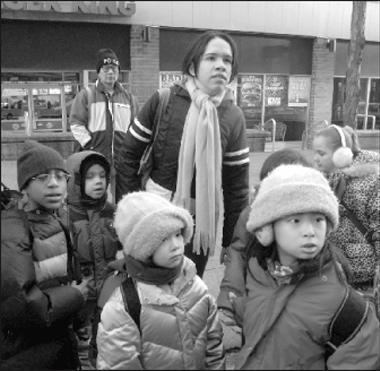By Skye H. Mcfarlane
To 9-year-old Chynna Basso, the whole thing seemed rather novel.
“We’re not going to school; we’re not going to school,” she chanted as she bounced up and down, her cheeks turning fuchsia in the single-digit cold.
But to Chynna’s mother, Patricia Basso, and the dozen other parents assembled outside the Fulton St. Burger King early Monday morning, the idea that their children might no longer have school bus service had many feeling exasperated.
“What the heck is going on?” asked one mother. “How are they choosing the kids?” asked another. “How is he going to get home?” implored a third.
The “Burger King kids,” as the bus drivers call them, are a group of 30 youngsters who catch the bus outside Southbridge Towers each day for a cross-town trip to P.S. 234. On Monday, however, the Department of Education’s mid-year bus route restructuring plunged the B.K. kids’ once-reliable school transportation into doubt.
In a bid to save an estimated $12 million a year, the D.O.E. first asked parents to register in order to receive bus service. Then the department used the registration information to restructure its busing system, eliminating 116 routes and changing the pattern and pickup times of others.
A press release on the D.O.E.’s Web site touted the money-saving changes: “We learned that some students who are eligible for yellow school bus service do not want it. With fewer students to route, we were able to change our buses to create fewer routes. This change will generate savings that will support schools and the teachers, books, and other instructional necessities they need to help students succeed.”
The release did not mention that many students who registered for bus service were dropped from their routes anyway because of technicalities, logistics or clerical error. Worse, some parents received little or no notice that their children’s routes would be changed or eliminated. A number of bus drivers were also befuddled by the changes, unsure of which kids to pick up, where and when.
Such was the case last Friday morning when the B.K. kids’ longtime morning bus driver showed parents his new schedule. Where once he had picked up 30 children, he was now only permitted to take nine — which nine, he wasn’t sure. Parents became more alarmed later that day when the afternoon bus driver handed out a cryptic flyer stating: “As of January 29, your child’s Route #M1136 will be deleted by the Department of Education. Your child may no longer have service or may be assigned to a different route.”
The flyer instructed parents to call a hotline at the Office of Pupil Transportation for more information, but when B.K. parent Sabrina Olson tried to call, she was put on hold and then bounced from employee to employee. When she tried to leave a message, she discovered that the agency’s mailbox was full, overwhelmed by parental confusion and complaints.
“We have to scramble like crazy. It upsets the whole routine of working mothers,” Olson said Friday. “It’s unacceptable that they would even consider getting rid of the bus.”
Also unacceptable to many B.K. parents was the sudden change in the children’s pickup time, which moved from 7:40 a.m. to 8:11 a.m. — too late for many of the working parents to both drop off their children and make it to work on time. According to the school, the children cannot be left at the bus stop unattended for more than 10 minutes.
On Monday morning, several parents showed up at 7:30 a.m., not even realizing that the bus schedule had changed. According to D.O.E. spokesperson Marge Feinberg, every child was supposed to have received a letter from his or her school saying whether or not the child would continue to receive bus service. Children losing bus service were to be offered full or half-fare MetroCards, depending on their age and their distance from school. The B.K. parents received neither letters nor MetroCards from P.S. 234. Therefore they stood anxiously Monday morning in the blustery cold, waiting to find out whether their children would get seats on the bus.
The bus driver brought good news that morning. Since he still hadn’t been told which nine kids to pick up, he would take them all. “Anyone here at 8:11, I’ll take them,” he said, blowing a kiss to the mothers. Somewhat disappointed that they would be making it to school after all, the kids hopped onto the bus. The mothers, however, were still uncertain as to how their children would be getting home, so they exchanged phone numbers and a small group of representatives took the subway to P.S. 234 in search of answers.
In the administrative office at P.S. 234, principal Lisa Ripperger, looking somewhat flustered, said that she was not sure what was going on and asked the parents if they had called 311 to get information. They had, they said, to no avail.
“Unfortunately, none of this was our decision,” Ripperger told the parents. She assured them that if their children did not have bus service home, the school would keep them in the building until a parent came to pick them up. The school’s bus coordinator told parents that older children might not “technically” be eligible for service, but she did not say why.
Across the city, newspapers and television sets Tuesday were filled with similar stories of confusion and inconvenience — from 5:45 a.m. pickup times, to siblings sent to different bus stops, to 6-year-olds being handed MetroCards and instructions on how to navigate the city bus system. In a prepared statement, the D.O.E. acknowledged that some families had experienced “difficulties” with the new system and said that the department was working with “schools and parents to resolve any legitimate concerns.”
As Downtown Express discovered, one tenth of a mile is all that stands between the B.K. kids and their bus eligibility. Because D.O.E. rules state that children in grades 3 through 6 must live more than one mile away from their school to be eligible for busing (the distance is half a mile for kids in K through 2), the revamped bus routes enforced the rules and booted 21 of the B.K. stop’s elder riders. The stop, at the corner of Fulton and Gold Sts., sits .9 miles from the school.
Without their school bus, students as young as seven would either have to take two city buses, a subway, or hoof it across town. The walk takes about 15 minutes for an adult traveling at a healthy pace through the Financial District’s crowded sidewalks. It involves crossing a minimum of 22 lanes of traffic during morning rush hour and navigating past double-parked loading trucks, street vendors and several construction zones.
Meanwhile, in Battery Park City, children of all ages bound for P.S. 89 still had their buses this week. In fact, the B.P.C. children had too many buses, as three different routes started running through the neighborhood. Two buses stopped simultaneously at the corner of Liberty St. and South End Ave. (a half mile from P.S. 89), leaving both drivers and students confused as to which students should take which bus — and making parents wonder whether the rerouting confusion is costing the D.O.E. more money than it is saving.
For now, though, the B.K. kids have been saved from dangerous walks and solo public transportation trips. Using the technique employed by many angry parents citywide, the B.K. parents have simply continued to put their children on the buses whether they are eligible or not (although the kids’ afternoon bus was cut, another bus route now stops on Fulton St.). According to Feinberg, their temporary reprieve may become permanent if the D.O.E. approves a pending “hazard variance” — a special permission for bus service based on the potential danger of a student’s walk to school.
But even if their own situation gets resolved, several B.K. moms have vowed to continue speaking out against the citywide bus rerouting.
“We want to make it one big voice. We want the mothers up in the Bronx and out on Staten Island to know that we’re talking about them, too. We’re doing this together,” said Olson, adding that she was prepared to make her case to the local elected officials.
Citing the city’s $4 billion budget surplus and the mayor’s focus on education reforms, various moms called the city’s cost-cutting measure “shameful,” “unnecessary,” and “unbelievable.”
Dominique Carmoega, a Southbridge Towers resident and the mother of a first grader at P.S. 234 said, “The mayor tries to push education, education. But hello, we can’t even get to school.”
Skye@DowntownExpress.com




























